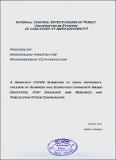| dc.description.abstract | The objective of this study was to assess the effectiveness of internal control system of public
universities in Ethiopia by taking Jimma University as a case study. Theoretical framework of internal
control suggested by COSO which included Control environment, Risk assessment, Control activities,
information and communication, and monitoring as components of effective Internal control were used
to guide the study. To conduct the research, both primary and secondary data were used. To gather
primary data,a questionnaire survey was administered. A questionnaire developed on the basis of the
study framework was pilot tested and commented by the staffs in the accounting department of Jimma
University. The final questionnaires were distributed to academic and administrative staffs of the
university selected using a quota sampling. Out of 318 questionnaires 203 were fully responded and
used in the analysis. Based upon the fully responded questionnaires 72.40% of the respondents are
administrative staffs and the remaining 27.60 % are academic staffs. Further, secondary data
including, Journals, auditors' report, minutes of external auditors exit meeting with university
management, manuals and working documents were considered to support data gathered through
questionnaire survey. Qualitative and quantitative data analysis techniques were employed. The result
of the study showed that, the internal control system of the university has some weakness with respect
to each component of internal control. The major finding behind the ineffectiveness of internal control
system that requires the management attention as per the study includes: low level of employee
awareness as to the mission and vision of their organization, handling jobs without a clear guideline
and understanding of the job descriptions, inadequately staffed work units, lack of training on
professional ethics in the area of procurement, finance and resource management, loss control on
efficient utilization of resource including vehicles, drugs, medical supplies and other resources of the
university. Low level of lower level mangers participation on planning and inability of identifying risks
associated with execution of the plan which makes mangers busy in crises management instead of
taking proactive actions. Lack of proper communication and coordination between administrative and
academic process managers, mainly finance and human resource departments do not exchange data
concerning employment status and there is a problem of effectively controlling payroll and nonpayroll
related pavements. Further in the management of asset as well, there is no periodic and
regular counting and also timely and proper disposal of retired assets. The monitoring aspect of the
internal control is also associated with weakness out of which comparison of budget and actual
performance is not conducted at all level. Even though the university established a clear structure and
communication channels, there is no swift flow of information through different levels and organs of
the organization. The current study focused on a single university and used a descriptive analysis
technique. Hence, future study that incorporated large number of universities and follow explanatory
study design need to be conducted to know the major challenged and to improve internal control
system of public universities in the country. | en |


